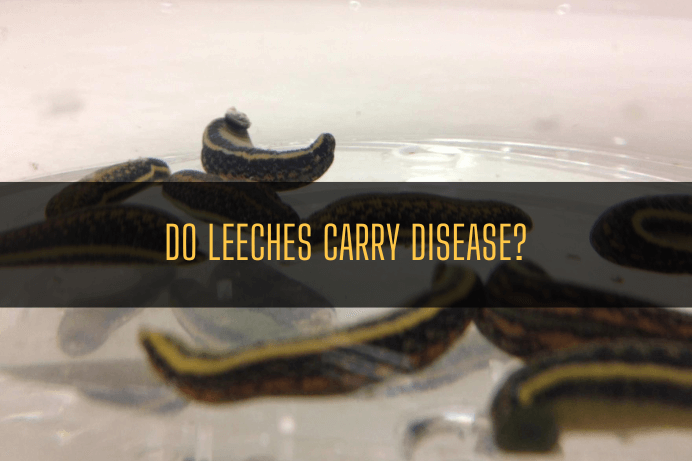Do Leeches carry disease? Unveiling Fact.

Being part of this universe, we find many creatures that not only seem but also sound strange, and being the highest of all creatures, our exploratory nature compels us to research such wired animals found on the earth.
Similarly, Leeches are creepy creatures that are almost found all over the world; there are nearly 600 different kinds of leeches. Most commonly found in grasses or fresh water, while certain species dwell in salt water. They must feed on a host in order to survive as parasites.
Many kinds of leeches are sanguinivorous, meaning they feed on blood. They’ll start sucking blood from humans once they’ve attached themselves to them. While feeding, leeches can increase their size by up to ten times, which enables them to extract a significant quantity of blood from their host.
Are they dangerous?
The severity of leeches feeding on you, their location, and your level of irritation towards them, all determine the outcome.
Typically, leeches feed for 20 to 30 minutes before detaching from your body. On average, bleeding from a leech bite may persist for 10 hours, but in some cases, it can extend for several days. According to Joslin, this duration can vary from simply inconvenient to reaching a medically severe level.
If you are healthy and get a single leech bite, you will likely experience some blood. However, if a large number of leeches attacks you at the same time, the effects might be severe. In Turkey, a guy presented to the emergency hospital with anemia and heavy bleeding from 130 leech bites. The anticoagulants in the leeches’ saliva had significantly reduced his blood’s ability to clot, threatening his life.
Are they Disease carriers as well?
Leeches can transmit diseases as they lack the immune system to sanitize their gut contents. When a leech with bacteria in its gut attaches to a person and regurgitates blood onto a wound, there is a risk of infection
transmission. It is essential to avoid squeezing, burning, or using other harsh methods to remove leeches, as they may release germ-filled blood. Medicinal leeches specifically can transmit diseases such as syphilis and erysipelas, which is a bacterial skin illness.
According to Joslin, if you opt for wild-caught leeches, it becomes uncertain which organisms or individuals the Leech had latched onto previously and if it had acquired any harmful bacteria, viruses, or parasites as a result.
Scientific research has revealed the presence of HIV and hepatitis B viruses in wild leeches in Africa. While no confirmed instances of transmission have been documented yet, Joslin suggests that if these viruses are present in the Leech’s digestive system, it is plausible that they could be transmitted.
Furthermore, these bloodsuckers possess a disturbing tendency. Typically, leeches latch onto exposed skin, but occasionally, they venture through the body’s openings and attach themselves internally. Leeches have been found in individuals’ eyes, ears, noses, throats, urethras, bladders, rectums, vaginas, and stomachs.
Kvist clarifies that this invasion is not accidental. When a leech infiltrates a person’s body, it is usually a member of the Praobdellidae family. These particular leeches are known for nourishing themselves through mucous membranes, indicating their desire to dwell internally. Kvist explains, “They find the rest of the skin less appealing, although they may resort to feeding on your leg if they are desperate for sustenance.”
How much time could Leech stay in the body?
A leech can remain in your body for several days or even weeks. Depending on where the Leech has ended up, there are various signs that it may be inside you.
Unusual bleeding from the affected area is one indication. In addition, leeches can lead to symptoms like fever, vomiting, difficulty urinating, and a feeling of foreign object movement, as Joslin and his team stated. If the Leech happens to be lodged in your throat, it can result in breathing difficulties, hoarseness, or changes in your voice. According to Joslin, even a single leech in a body cavity or on your eyeball, among other places, could cause significant issues.
How to avoid Leeches?
If you’re in an area where land leeches abound, preventing them from attaching to your skin can be challenging. According to Kvist, these leeches can easily infiltrate your clothes, making it hard to repel them completely. However, wearing long garments tucked in when exploring leech-infested regions can help. Additionally, insect repellents with DEET or DEPA might offer some deterrent effect against leeches.
Regrettably, specific enticing locations for swimming and outdoor exploration are also favored by leeches. However, this does not imply that you should renounce visiting lakes or ponds altogether.
According to Joslin, it would be advantageous to possess knowledge about removing leeches, being cautious, and treating any encounters that may occur. This approach is superior to solely avoiding areas where leeches might reside.

